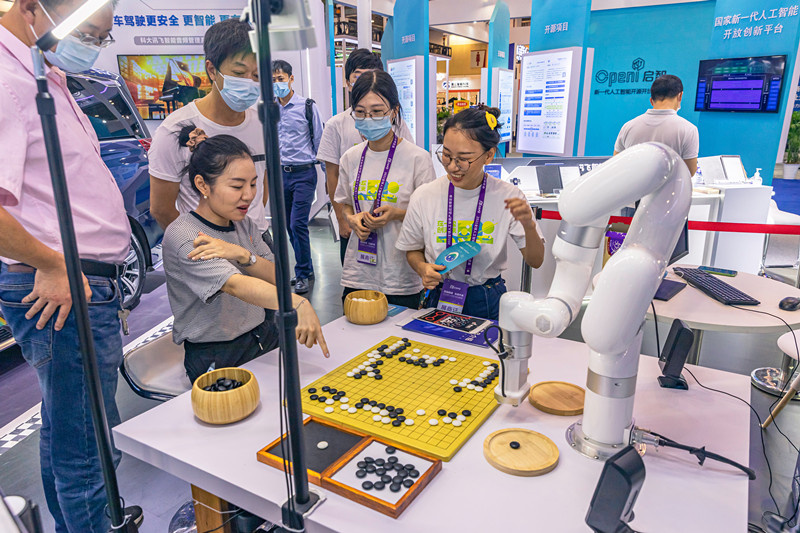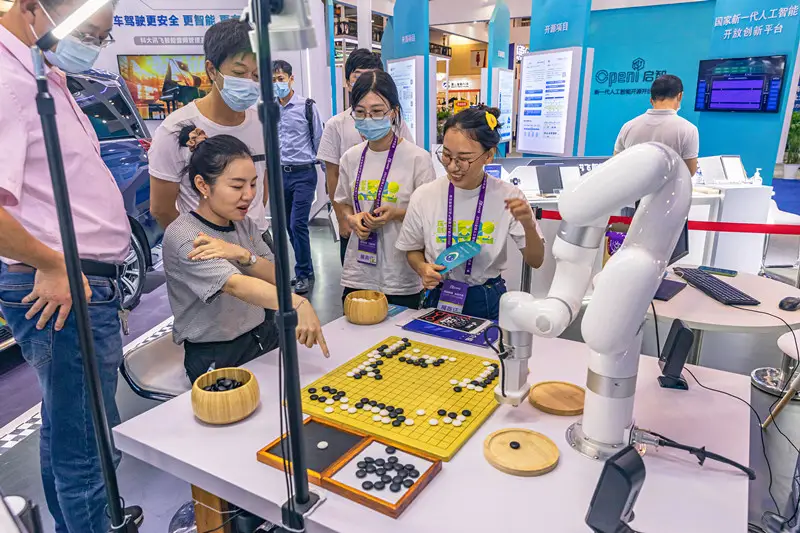By Liu Shiyao, People's Daily

A woman plays go game with a robot at the 2021 Global AI Product & Application Expo held in Suzhou, east China's Jiangsu province, Sept. 18, 2021. (Photo by Zhang Feng/People's Daily Online)
AI (artificial intelligence) trainer is a new job that comes with the wide application of AI technology. The duty of the job is to make AI perform better in understanding and serving humans.
Data analysis and annotation, algorithm selection and optimization, model training, and project design are all within the scope of work of AI trainers.
It took only four years for the job to have developed into a profession from a notion. At present, China is home to over 200,000 AI trainers, and the number is expected to hit five million globally in 2022.
Wei Zimu is an AI trainer and engineer from Haizhi Technology, a Beijing-based data company. According to her, the company's AI training system is generally deployed on the private cloud networks of its customers.
"Recently, together with the financial project team of the company, I'm using AI technology to evaluate and predict user behaviors, so as to help banks assess anti-fraud, anti-money laundering, and post-loan risks," Wei told People's Daily while simulating how AI is trained on a demo system.
She said the systems of the banks always come with a large amount of data, so it needs all-rounded investigation into the features of the banks' users and how data should be exploited. That's why Wei must have, apart from AI technology, profound understanding of the actual demands of financial businesses.
"The selection of a proper algorithm is the most important task in data analysis," she said, explaining that algorithms are like formulas, and the more they comply with the laws of the data, the more precise prediction they would make.
After selecting a proper algorithm, Wei inputted data into it and started training models, which was a huge task. She told People's Daily that the process of AI computing is like the growth of a tree. At first, the tree only has a trunk and then it grows branches that go toward different directions. After twigs are grown on the branches, the tree becomes lush.
Based on the algorithm, computing go automatically according to mathematical principles, which finally form a set of decisions that demonstrat probabilities and predictions.
AI trainers can decide how tall the tree should grow and when it should stop growing, she introduced, adding that the algorithm makes decisions according to the setting of the trainers.
"In other words, even if I and another trainer are using the same data and algorithm, our analysis results could be different because we might apply different parameters during the training due to our different understanding of the business," she said. This is related to the technical capability of the engineers, as well as an enterprise's core technologies and its understanding of the industries it serves, she added.
Finally, the demo system gave a scorecard that showed the risks of borrowers being delinquent and what should the banks do to respond. What AI technology can do for the financial industry is to prevent financial risks, spot frauds, refine financial services and lower the cost.
Wei, 26, majored in math at university and got a master's degree last year. She's always ready to learn. "If you want to become an outstanding AI trainer, you have to keep your knowledge updated apart from having solid math and computer capabilities," she told People's Daily.
Data analysis and annotation, algorithm selection and optimization, model training, and project design are all within the scope of work of AI trainers.
It took only four years for the job to have developed into a profession from a notion. At present, China is home to over 200,000 AI trainers, and the number is expected to hit five million globally in 2022.
Wei Zimu is an AI trainer and engineer from Haizhi Technology, a Beijing-based data company. According to her, the company's AI training system is generally deployed on the private cloud networks of its customers.
"Recently, together with the financial project team of the company, I'm using AI technology to evaluate and predict user behaviors, so as to help banks assess anti-fraud, anti-money laundering, and post-loan risks," Wei told People's Daily while simulating how AI is trained on a demo system.
She said the systems of the banks always come with a large amount of data, so it needs all-rounded investigation into the features of the banks' users and how data should be exploited. That's why Wei must have, apart from AI technology, profound understanding of the actual demands of financial businesses.
"The selection of a proper algorithm is the most important task in data analysis," she said, explaining that algorithms are like formulas, and the more they comply with the laws of the data, the more precise prediction they would make.
After selecting a proper algorithm, Wei inputted data into it and started training models, which was a huge task. She told People's Daily that the process of AI computing is like the growth of a tree. At first, the tree only has a trunk and then it grows branches that go toward different directions. After twigs are grown on the branches, the tree becomes lush.
Based on the algorithm, computing go automatically according to mathematical principles, which finally form a set of decisions that demonstrat probabilities and predictions.
AI trainers can decide how tall the tree should grow and when it should stop growing, she introduced, adding that the algorithm makes decisions according to the setting of the trainers.
"In other words, even if I and another trainer are using the same data and algorithm, our analysis results could be different because we might apply different parameters during the training due to our different understanding of the business," she said. This is related to the technical capability of the engineers, as well as an enterprise's core technologies and its understanding of the industries it serves, she added.
Finally, the demo system gave a scorecard that showed the risks of borrowers being delinquent and what should the banks do to respond. What AI technology can do for the financial industry is to prevent financial risks, spot frauds, refine financial services and lower the cost.
Wei, 26, majored in math at university and got a master's degree last year. She's always ready to learn. "If you want to become an outstanding AI trainer, you have to keep your knowledge updated apart from having solid math and computer capabilities," she told People's Daily.
 Menu
Menu
 AI trainer - a brand new profession in China that sees bright prospects
AI trainer - a brand new profession in China that sees bright prospects
















